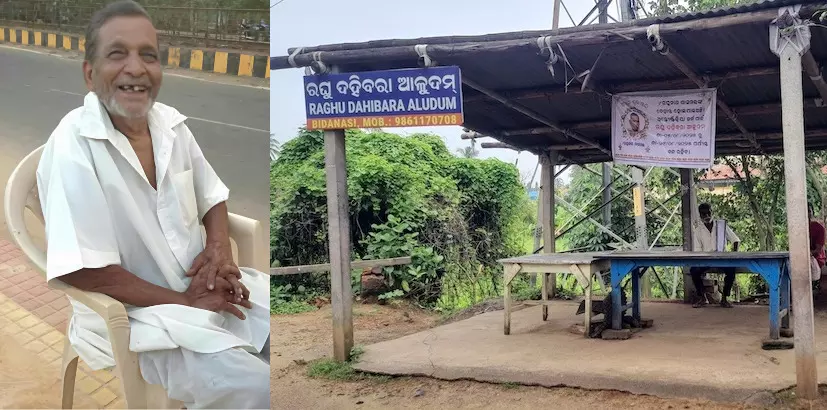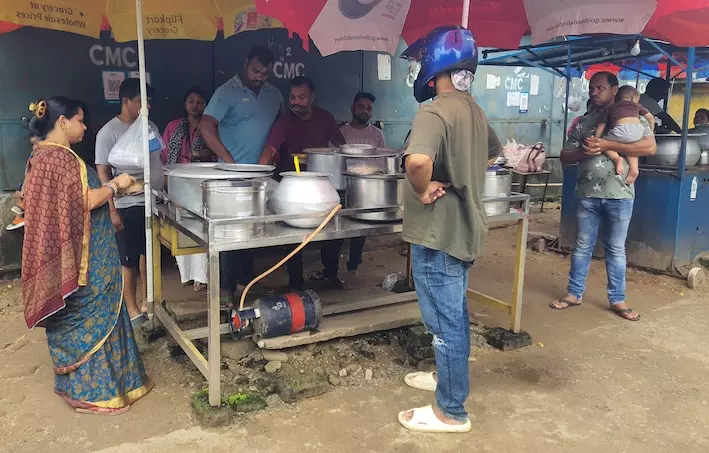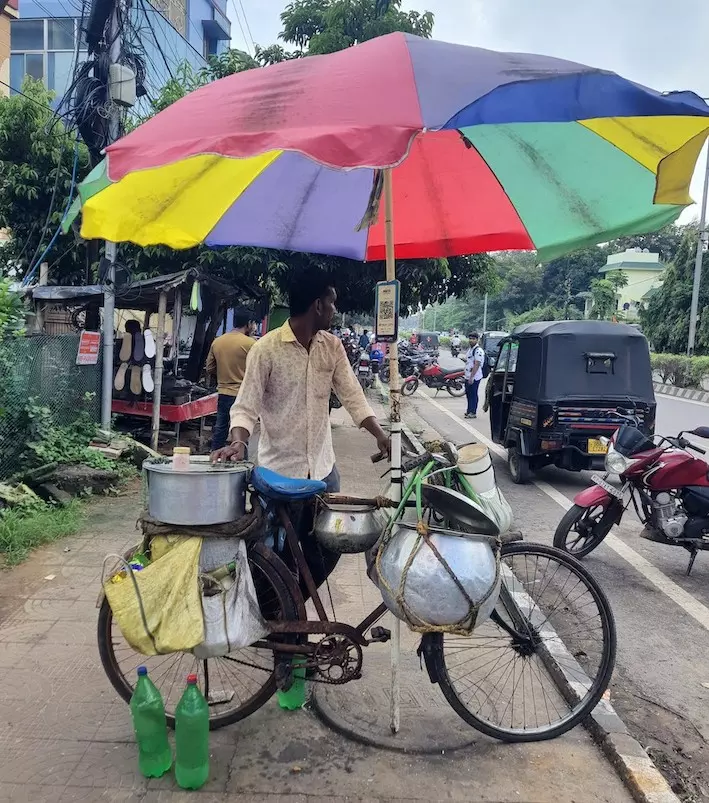
- Home
- India
- World
- Premium
- THE FEDERAL SPECIAL
- Analysis
- States
- Perspective
- Videos
- Sports
- Education
- Entertainment
- Elections
- Features
- Health
- Business
- Series
- In memoriam: Sheikh Mujibur Rahman
- Bishnoi's Men
- NEET TANGLE
- Economy Series
- Earth Day
- Kashmir’s Frozen Turbulence
- India@75
- The legend of Ramjanmabhoomi
- Liberalisation@30
- How to tame a dragon
- Celebrating biodiversity
- Farm Matters
- 50 days of solitude
- Bringing Migrants Home
- Budget 2020
- Jharkhand Votes
- The Federal Investigates
- The Federal Impact
- Vanishing Sand
- Gandhi @ 150
- Andhra Today
- Field report
- Operation Gulmarg
- Pandemic @1 Mn in India
- The Federal Year-End
- The Zero Year
- Science
- Brand studio
- Newsletter
- Elections 2024
- Events
How Raghunath Sasmal made Dahibara Aludum a part of Odisha’s culinary legacy
Raghunath Sasmal, Raghu Mausa to generations of Odias, who died at 94 on August 16, began serving Dahibara Aludum in 1950, and turned his modest stall in Cuttack into a hub of Odisha’s most iconic street food

A tightly roped polythene sheet stares silently at the two old wooden tables beneath. Keeping them company is a broken concrete electric pole lying nearby. A tiny signboard hanging on the left corner of this makeshift arrangement announces its identity: ‘Raghu Dahibara Aludum.’ At the other end of it, a freshly printed flex sign informs: ‘Raghunath Sasmal has passed away. The shop...
A tightly roped polythene sheet stares silently at the two old wooden tables beneath. Keeping them company is a broken concrete electric pole lying nearby. A tiny signboard hanging on the left corner of this makeshift arrangement announces its identity: ‘Raghu Dahibara Aludum.’ At the other end of it, a freshly printed flex sign informs: ‘Raghunath Sasmal has passed away. The shop will remain closed from August 16 to August 19: till completion of the rites.’
Ironically, this unimpressive stall at Bandha Sahi in Bidanasi locality along the Ring Road overlooking Kathajodi River is among the most popular addresses of Cuttack, the Millennium city (also known as the Silver City due to its famous silver filigree works), and the commercial and cultural hub Of Odisha. For decades together, Raghu’s shop saw scores of people wait patiently well before it opened and remained overcrowded till business came to a halt.
Today, the shop wears an abandoned look, as if it’s in a state of grieving. Illiterate, Raghu never held any position of authority. However, the news of his death was carried widely by the media, both print and electronic. Shocked, countless people silently strolled down their memory lanes, cherishing happier moments with their dear Raghu Mausa (Uncle).
It was Raghu who popularised Dahibara Aludum, which has given Cuttack a distinct culinary identity. His is the story of an ordinary individual leaving behind an enviable legacy. Dahibara Aludum is part of Odisha’s rich culinary tradition. Affordable and easily available, the dish not only excites the taste buds but is also considered a healthier option. People simply love this snack.

Raghunath Sasmal (left); His stall, Raghu Dahibara Aludum, at Bandha Sahi in Bidanasi locality of Cuttack. Photos: Special arrangement
Reflecting on his student days at Cuttack’s Stewart Science College, popular actor Bobby Mishra recalls how he and his friends, living in the Mahanadi Vihar locality, cycled 12 km daily to enjoy Raghu Mausa’s speciality. “There were others who sold more, but none could match the taste or aroma of Mausa’s offerings. The homemade chilli flakes he sprinkled on the mouth-watering dish were an added attraction,” Mishra remembers.
In later years, Mishra would steal time from his erratic shooting schedules to rush back to Raghu Mausa for more delightful experiences. “I can’t forget his infectious smile or the warmth with which he served. Food offered with a smile not only tastes good, it fills your heart as well,” says Mishra, who has acted in Odia, Bengali, Tamil, Telugu, Kannada, and Bhojpuri films.
Also read: How Makhana cultivation in Bihar leaves farmers struggling for survival
Homemaker Sucharita Verma, 44, recalls that while studying in Cuttack she would land up at the shop in a rickshaw. “One plate of the dish made my day; the taste was just out of this world. Gone are those days,” she reminisces. Equally nostalgic is Bhubaneswar-based veteran columnist Shyam Sundar Agrawala, 77.
Agrawala explains that Aloo Dum is primarily a North Indian dish. While in Odisha it is typically served with puri or paratha, ghuguni (a dish made of black gram) usually accompanies bara. For the first time, Raghu experimented with the Dahibara Aludum combination. He recalls that way back in the 1960s, during his degree days at Ravenshaw College, he had his first brush with Raghu’s delicacies. “The Dahibara melted instantly and I can’t describe the taste of the Aludum. Instantly, I fell in love with the unique combination,” says Agrawala.

Tofan Sasmal caters to his customers adjacent to Raghu Mausa's stall.
In the subsequent six decades, Agrawala’s love for the dish only grew stronger. The owner of Bhubaneswar’s first upmarket textiles showroom, Satyam Shivam Sundaram, he often introduced his guests — including relatives, visiting senior executives of textile companies, and traders — to the taste of Raghu’s Dahibara Aludum.
Over the years, Raghu Dahibara Aludum has enjoyed loyal patronage from connoisseurs across professions, age groups, and social strata in the state. Odias living in Delhi, Mumbai, Chennai, Bengaluru, and other cities often carried their favourite dish with them.
According to Kedarnath, 62, who has been managing the operations at Raghu Dahibara Aludum, their valued customer base includes many well-known names. Kedar is the son of Raghu’s elder brother, Ratnakara. “Naveen Babu (former Odisha Chief Minister Naveen Patnaik) is fond of our Dahibara Aludum. Several times, his Biju Janata Dal (BJD) colleagues carried it for him,” informs Kedar. With a wide grin, he adds, “Many of the new customers now address me as Raghu Mausa.”
Also read: Why the same activists, political leaders are detained every time PM Modi visits Gujarat
However, many believe Raghu was unique for three reasons. First, he served his food on biodegradable plates made of Sal leaves. Second, though his offerings were the most sought after — and he could easily have run a chain of outlets or patented the dish — he chose to sell only a limited amount. Raghu believed that if all customers came to him, how would others run their families? Most importantly, his success and popularity made Dahibara Aludum a sustainable livelihood option for thousands of others. “Unfortunately, the government never recognised his art or contributions,” rues Agrawala.
Today, outlets selling Dahibara Aludum from stationary units as well as auto-rickshaws, bikes, mopeds, and even cycles are a common sight in Odisha. In the twin cities of Bhubaneswar and Cuttack alone, there are more than 4,000 such vendors. One of them is 41-year-old Bapi Sahu, who inherited the business from his late father thirteen years ago. While his father ran the enterprise on a cycle, Bapi now operates from a cargo auto-rickshaw. The location, however, in Bhubaneswar’s posh IRC Village, has remained unchanged. By his own admission, Bapi caters daily to roughly 300 customers, in addition to 100-150 parcel orders. Each plate — containing Dahibara, Aludum, ghuguni, chutney, onion, and bhujia — costs Rs 40.

Prashant Sahu's family has been living on this shop on a cycle in Bhubaneswar for the last seven years.
Bapi employs two others. It is a labour-intensive job, and bigger outlets employ even more people. He may not have studied beyond the intermediate level, but he is determined to provide proper education to his school-going son and daughter. “I will allow them to pursue their educational dreams,” he declares. Barely a kilometre away, on the CRP Square-Jayadev Vihar stretch, 39-year-old Prashant is busy adjusting the umbrella over his cycle-borne outlet. Unlike Bapi, he offers only Dahibara Aludum — though, of course, each plate is topped with onions and bhujia. By his own admission, Prashant had arrived a bit late today. Yet within an hour, he had already sold 20-25 plates. Most of his customers, he says, are students. His daily turnover: “Rs 1,500 or a little more.”
Bapi, Prashant, and others in the trade unhesitatingly acknowledge that Raghu Mausa has been their inspiration. “Only because of him, poor people like me can somehow run a family. For us, he is next to God,” concedes Prashant. In the absence of structured data or accurate figures, it is difficult to gauge the economics of this business in Cuttack. Some estimate it to be in crores, but that remains purely guesswork.
Sociologist Navaneeta Rath observes that the thousands selling the dish in Odisha are, in their own way, preserving it from the erosion of food culture at the family level. They also reinforce its relevance among younger generations, despite fierce competition from multinational fast-food chains such as KFC, Pizza Hut, and McDonald’s. Rath notes that the income from this venture raises living standards and gives sellers the confidence to foresee a better future for their children. Many have even turned entrepreneurs in their own right.
“Unfortunately, it has not yet captured the attention of our state enumerators, who have failed to document the employment generated by this business. It remains a missing chapter in research archives,” she adds. Start-ups and entrepreneurship may be the buzzwords of the day. However, the countless vendors who have run their small ventures successfully for decades remain unrecognised. They exist on the wrong side of the economy: the informal sector.

Brisk business at Bapi Sahu's counter that operates on an autorickshaw in Bhubaneswar.
A sombre atmosphere grips Raghu’s modest house in Gopal Sahi, barely a few hundred metres from his shop. As the name suggests, nearly all 300 families in this overcrowded colony belong to the Gopal caste, whose traditional occupations include dairy farming and cattle herding. More than 200 families of Gopal Sahi now earn their livelihood by selling Dahidara Aludum.
Raghu Mausa was the patriarch of a joint family that includes his two sons — Lingaraj, 55, along with his wife and children, and the younger Banamali, 42 — as well as Kedar’s family. Together, they continue to run the family business, with help from two employees. Until a few years ago, before age-related complications slowed him down, Raghu was a regular at the shop, keeping a close tab on everything. Kedar recalls that his uncle even helped with chopping onions until a month before his death.
Adjusting his hearing aid, Kedar shares the history of their shop as he heard it from his uncle Raghu. According to him, Raghu’s father owned a few cows and lived in the nearby forest, where Ratnakar assisted him. At their hut in Gopal Sahi, Raghu’s mother, Champa Dei, struggled hard to feed her children — Raghu and his sisters. Concerned, she decided to follow her father’s footsteps. The idea of making Bara and Aloo Kasha (spiced boiled potato without gravy), which her father once sold in her native village near Paradip, appealed to her. She experimented with the same at home. The responsibility of selling those items, however, fell on Raghu’s tiny shoulders.
Also read: How ragi and jowar rotis, a village staple, became urban superfood in Telugu states
Soon, the experiment clicked. Encouraged, she later began serving Dahi along with Bara and Aloo Kasha (spicy boiled potato without gravy) for a richer taste. That too won appreciation. Finally, in 1950, at the age of 15, Raghu started his own outlet, offering DahibaraAloodum and a few peda (a sweet made of milk and flour). For years, he ran the shop at Cuttack’s Barabati Fort before relocating to Bidanasi.
While others began adding ghuguni, various chutneys, and other extras, Raghu stuck to the original combination until his death. He was firmly against turning it into a “chaat-style” offering. Kedar says they sell around 300 plates a day, each costing Rs 50. The shop opens at 4.30 in the afternoon and runs for just over an hour, until about 6 p.m. They hardly need a bulb or electric light, as everything is sold out within minutes.
With his trademark smile, Raghu would politely refuse requests for bulk orders during wedding seasons and other social events. Perhaps his childhood hardships had taught him to nurture only modest ambitions. According to Kedar, Raghu kept a strict eye on every detail — from procurement of ingredients and preparation of items to customer satisfaction. “‘Quality can’t be compromised, come what may,’ was his constant instruction,” recalls Kedar.
“He taught us that each customer is like a family member. We are emotionally obliged to them. It is our prime duty to protect their interest. We will carry forward this legacy,” asserts Kedar. Incidentally, in 2017, Raghu represented Odisha at the Odisha Parba in Delhi. Reportedly, he even carried water from Cuttack to keep the flavour authentic. Needless to say, he received the first prize there. Today, trophies and awards lie tucked away in a dusty cupboard in a dimly lit room of Raghu’s house. They look small, almost dwarfed, under the towering shadow of his legacy.
